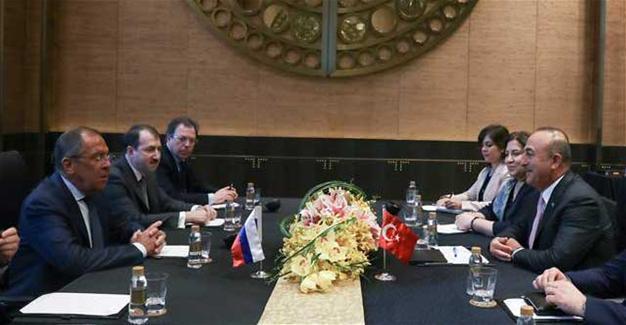Turkey’s Çavuşoğlu talks Syria with US, Russian counterparts in Manila
MANILA
 Foreign Minister Mevlüt Çavuşoğlu met on Aug. 6 with his Russian counterpart Sergei Lavrov in the Philippine capital Manila during the Association of Southeast Asian Nations (ASEAN) Regional Forum, before holding a meeting with U.S. Secretary of State Rex Tillerson later in the day.
Foreign Minister Mevlüt Çavuşoğlu met on Aug. 6 with his Russian counterpart Sergei Lavrov in the Philippine capital Manila during the Association of Southeast Asian Nations (ASEAN) Regional Forum, before holding a meeting with U.S. Secretary of State Rex Tillerson later in the day. Speaking to reporters after the bilateral talks with Lavrov, Çavuşoğlu said they discussed the ongoing Syrian conflict, the Astana talks, visa-free travel for Turkish citizens to Russia, and economic ties, especially the possible lifting of a ban on export of Turkish tomatoes to Russia.
“It was a positive meeting,” he said.
Ahead of the key meetings, Turkey sent artillery units to the border with Syria on Aug. 5, where its army regularly clashes with the outlawed Kurdistan Workers’ Party (PKK) militants, state-run Anadolu Agency has reported.
A military convoy with at least five howitzers arrived overnight at the southern city of Kilis, the scene of recent cross-border fire between the Turkish army and the Kurdish Peoples’ Protection Units (YPG).
The new units were there to reinforce rather than replace the artillery already in place, the agency reported, citing military sources.
Across the border from the province of Kilis lies an area of northwest Syria that is controlled by the YPG, which is Washington-backed but deemed a terror group by Ankara due to its ties to the PKK.
Already in August 2016, Turkey launched a ground offensive into northern Syria to push back Islamic State of Iraq and the Levant (ISIL) militants and prevent the YPG forces linking up their different zones of control.
Separately, about 2,000 ISIL militants are estimated to remain in the Syrian city of Raqqa, fighting for their survival in the face of an offensive by the U.S.-backed Syrian Democratic Forces (SDF), a senior U.S. official said on Aug. 4. The YPG constitutes the backbone on the SDF.
Brett McGurk, the U.S. special envoy for the coalition against ISIL, said the SDF had cleared about 45 percent of Raqqa since launching an attack in early June to seize ISIL’s stronghold in northern Syria.
“Today in Raqqa ISIS is fighting for every last block ... and fighting for their own survival,” McGurk told reporters, using another acronym for the jihadist group.
Some 2,000 ISIL militants are left in the city and “most likely will die in Raqqa,” he said.
The assault on Raqqa coincided with the final stages of a campaign to drive ISIL from the Iraqi city of Mosul, where the jihadist militants were defeated last month.
McGurk said ISIL has lost 27,000 square kilometers of the territory it once held in the two countries - 78 percent of what they had seized in Iraq and 58 percent of what they held in Syria.
In Manila, Turkish Foreign Minister Çavuşoğlu also said Turkey remains interested in building closer economic and diplomatic ties with ASEAN states.
“We aim to boost our relations with the region. With the latest decree, we have appointed an ambassador to Laos, so now we have missions in every ASEAN state,” he said.
The bloc was established in 1967 and includes 10 states: Brunei, Cambodia, Indonesia, Laos, Malaysia, Myanmar, Philippines, Singapore, Thailand and Vietnam.
Çavuşoğlu also hinted that Turkey was close to securing a sectoral dialogue partnership with the ASEAN group.
“We applied for sectoral dialogue partnership with ASEAN in 2015 and since then, we have been working for it. We also submitted an action plan in 2016. The decision will be announced tomorrow,” he said.
Although not a member of the bloc, Turkey formed ties with ASEAN in 1999 and attended its first summit in 2013. It has also applied for ASEAN partnership and signed a cooperation treaty in 2010, according to the Foreign Ministry.
















